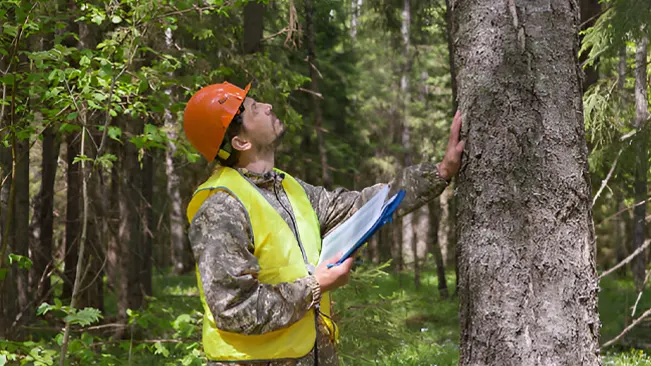Top 10 High-Paying Forestry Jobs
- July 24, 2024
- 0 comment
Forestry jobs and arboriculture offer a range of rewarding career paths for those passionate about the environment and sustainable management. As global awareness of environmental issues grows, so does the demand for professionals in these fields. Not only are these careers crucial for conservation and management, but they also offer significant earning potential.
This article explores the top 10 high-paying careers in forestry and arboriculture, highlighting their roles, responsibilities, and the factors contributing to their financial rewards.
10 High-Paying Forestry Jobs
1. Urban Forester
Urban foresters are responsible for managing and planning green spaces within urban environments. They ensure the health and safety of trees, contribute to urban planning, and enhance the quality of life for city residents. Their duties include tree planting, pruning, disease management, and community education.

Average Salary: Urban foresters can expect to earn between $50,000 and $80,000 annually, depending on their location and level of experience. In major metropolitan areas, salaries can exceed $90,000.
Required Qualifications: A degree in forestry, arboriculture, or a related field is typically required, along with certifications such as the International Society of Arboriculture (ISA) Certified Arborist credential.
Career Prospects: As cities continue to expand, the demand for urban foresters is expected to grow, offering robust job security and opportunities for advancement.
2. Forest Manager
Forest managers oversee the sustainable management of forest resources, balancing conservation with commercial interests. They plan and implement forestry jobs, monitor forest health, and ensure compliance with environmental regulations.

Average Salary: Salaries for forest managers range from $60,000 to $100,000 per year, with potential for higher earnings in senior positions or with extensive experience.
Required Qualifications: A bachelor’s or master’s degree in forestry or a related discipline is required, along with relevant experience. Certifications like the Society of American Foresters (SAF) Certified Forester credential can enhance job prospects.
Career Prospects: The demand for sustainable forest management practices is driving job growth in this field, with excellent long-term career opportunities.
3. Arboriculture Consultant
Arboriculture consultants provide expert advice on tree care, health, and safety. They conduct tree assessments, recommend management practices, and may serve as expert witnesses in legal cases involving trees.

Average Salary: Arboriculture consultants can earn between $60,000 and $120,000 annually, with top consultants in high demand earning even more.
Required Qualifications: Extensive experience in arboriculture, along with certifications such as the ISA Board Certified Master Arborist credential, are essential for this role.
Career Prospects: The need for specialized tree care and management services is increasing, ensuring a steady demand for experienced consultants.
4. Conservation Scientist
Conservation scientists conduct research and implement practices to protect natural ecosystems. They work on habitat restoration, species conservation, and environmental impact assessments.

Average Salary: Conservation scientists typically earn between $50,000 and $90,000 per year, with opportunities for higher salaries in leadership or specialized research roles.
Required Qualifications: A degree in environmental science, biology, or a related field is required, along with field experience and possibly a graduate degree for advanced positions.
Career Prospects: Growing environmental awareness and regulatory requirements are driving demand for conservation scientists, offering strong career prospects.
5. Silviculturist
Silviculturists manage the growth, composition, and health of forests. They develop and implement plans for reforestation, thinning, and controlled burns to maintain healthy forest ecosystems.

Average Salary: Salaries for silviculturists range from $55,000 to $95,000 annually, depending on experience and location.
Required Qualifications: A degree in forestry jobs or a related field, along with specialized training in silviculture, is necessary. Certifications from professional forestry organizations can be beneficial.
Career Prospects: The emphasis on sustainable forest management practices ensures ongoing demand for skilled silviculturists.
6. Timber Procurement Forester
Timber procurement foresters are responsible for sourcing and acquiring timber for commercial use. They negotiate with landowners, oversee logging operations, and ensure compliance with environmental regulations.

Average Salary: These professionals can earn between $60,000 and $100,000 annually, with potential for higher earnings based on experience and success in negotiations.
Required Qualifications: A degree in forestry, business, or a related field is typically required, along with experience in timber procurement and knowledge of market conditions.
Career Prospects: The ongoing demand for timber and forest products supports strong job prospects in this field.
7. Environmental Planner
Environmental planners develop plans and policies for land use and conservation. They work with government agencies, private companies, and communities to ensure sustainable development practices.

Average Salary: Environmental planners typically earn between $55,000 and $90,000 annually, with senior positions commanding higher salaries.
Required Qualifications: A degree in environmental planning, urban planning, or a related field is required. Certification from the American Planning Association (APA) can enhance career opportunities.
Career Prospects: The need for sustainable land use and development practices ensures a steady demand for environmental planners.
8. Forestry Professor/Researcher
Forestry professors teach and conduct research at universities and research institutions. They publish their findings, secure research funding, and mentor students.

Average Salary: Professors and researchers can earn between $60,000 and $110,000 annually, with potential for higher earnings in prestigious institutions or with significant research achievements.
Required Qualifications: A doctoral degree in forestry or a related field is typically required, along with a strong record of research and publications.
Career Prospects: Academic and research positions offer stable, long-term career opportunities with the potential for advancement to senior roles.
9. Forest Fire Prevention Specialist
These specialists develop and implement strategies to prevent and manage forest fires. They conduct fire risk assessments, plan controlled burns, and educate the public on fire safety.

Average Salary: Forest fire prevention specialists typically earn between $50,000 and $85,000 per year, with higher salaries for those in leadership positions or with extensive experience.
Required Qualifications: A degree in forestry, fire science, or a related field, along with specialized training in fire prevention and management, is necessary.
Career Prospects: The increasing incidence of wildfires due to climate change is driving demand for skilled fire prevention specialists.
10. Natural Resource Manager
Natural resource managers oversee the sustainable use and conservation of natural resources, including forests, water, and wildlife. They develop management plans, conduct environmental impact assessments, and coordinate with stakeholders.

Average Salary: These professionals can earn between $60,000 and $100,000 annually, with potential for higher earnings based on experience and the scope of their responsibilities.
Required Qualifications: A degree in natural resource management, environmental science, or a related field is required. Experience in resource management and relevant certifications can enhance job prospects.
Career Prospects: The need for sustainable resource management practices ensures ongoing demand for skilled professionals in this field.
Conclusion
Pursuing a career in forestry jobs and arboriculture not only offers the satisfaction of contributing to environmental conservation but also provides substantial financial rewards. From urban foresters managing city green spaces to conservation scientists protecting natural habitats, these careers play a vital role in sustainable management and offer promising future prospects.
As the world continues to prioritize environmental sustainability, the demand for skilled professionals in these high-paying careers is set to grow, making it an opportune time to explore and invest in these rewarding career paths.
Frequently Asked Questions (FAQs)
- What is the average salary for an urban forester?
Urban foresters typically earn between $50,000 and $90,000 annually. The salary can vary based on location, experience, and certifications such as the ISA Certified Arborist credential. - What qualifications are needed to become a forest manager?
To become a forest manager, you generally need a bachelor’s or master’s degree in forestry jobs or a related field. Additional certifications, such as the Society of American Foresters (SAF) Certified Forester credential, and relevant experience are also beneficial. - What does an arboriculture consultant do?
An arboriculture consultant provides expert advice on tree care, health, and safety. They conduct tree assessments, recommend management practices, and may serve as expert witnesses in legal cases involving trees. - How much can a conservation scientist expect to earn?
Conservation scientists typically earn between $50,000 and $90,000 per year. Higher salaries are possible in leadership or specialized research roles, depending on experience and location. - What is the role of a silviculturist?
Silviculturists manage the growth, composition, and health of forests. They develop and implement plans for reforestation, thinning, and controlled burns to maintain healthy forest ecosystems. - What qualifications are required for a timber procurement forester?
Timber procurement foresters usually need a degree in forestry jobs, business, or a related field. Experience in timber procurement and knowledge of market conditions are also important.
What is the job outlook for environmental planners?
The demand for environmental planners is expected to remain steady due to the increasing need for sustainable land use and development practices. They typically earn between $55,000 and $90,000 annually. - What do forestry professors and researchers do?
Forestry jobs professors teach and conduct research at universities and research institutions. They publish their findings, secure research funding, and mentor students. Salaries range from $60,000 to $110,000 or higher, depending on the institution and research achievements. - How does one become a forest fire prevention specialist?
To become a forest fire prevention specialist, you typically need a degree in forestry jobs, fire science, or a related field, along with specialized training in fire prevention and management. - What is the average salary for a natural resource manager?
Natural resource managers can earn between $60,000 and $100,000 annually, with the potential for higher earnings based on experience and the scope of their responsibilities. A degree in natural resource management, environmental science, or a related field is usually required.











Leave your comment